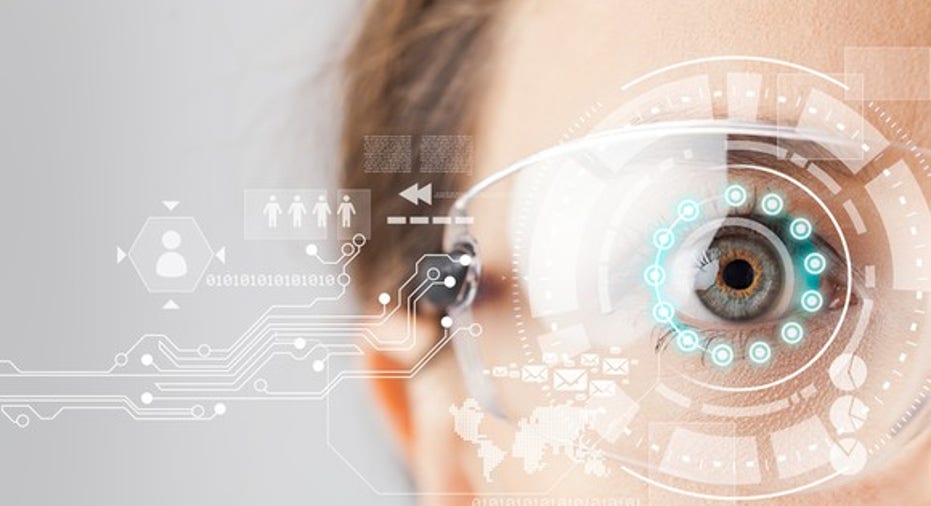Will Smart Glasses Kill the Smartphone?

As you walk down the hallway at work, an attractive coworker approaches. You’ve seen her around but blank on her name. Just then, “Ashley Tate” flashes on the perimeter of your visual field. “Hey Ashley,” you say with a smile. She smiles back.
Back at your desk, your gloved finger taps the name in the air in front of you and brings up Ashley’s LinkedIn profile. Turns out she’s a VP, and therefore very much out of your league. Feeling a little silly, you swipe left, deleting the window.
Time to get your mind out of the gutter and back to work, you whisper a code word, followed by “let me see the marketing department’s Q4 2019 budget proposal,” pausing for a second, then “and pick up where I left off with Coldplay, for my ears only.”
If that scene seems a bit far-fetched, it’s not. In the not-too-distant future, we’re going to be living in a hands-free, video-centric computing world where artificial intelligence (AI) and augmented reality (AR) come together through a not-so-ordinary pair of glasses. And nothing will be the same … except human behavior, that is.
Google had the right idea with Glass. The blowback wasn’t because Glass was ahead of its time or a lousy implementation. Think of it more as a sacrifice to a society where radical change takes some getting used to. Also, its early adopters did act like glassholes, and $1,000 was more than a little pricey.
It reminds me of the first portable music players. Walking around with a wire running up your shirt and earbuds sticking out of your ears seemed ridiculous at first. Now every smartphone has a jukebox inside and Apple caused an uproar when it deleted the iPhone’s headphone jack and declared wireless to be the new thing.
The point is, we’re so used to interfacing with computers through two-dimensional displays and keyboards and describing the world around us through crude textual interpretations of what we see and hear, that the very notion of accessing and sharing information through human senses seems strangely foreign.
Soon enough, that will change. Besides Google parent Alphabet, tech giants Apple and Facebook and secretive startups with major league funding like Magic Leap are all working on breaking the boundary between man and machine by bringing AI and AR to users through smart glasses.
Considering that we’re all just starting to get used to talking to smart virtual assistants like Alexa and Siri, I realize that sounds like a big leap. It’s probably a good thing that the first product to hit the market is sort of a baby step from Snapchat parent Snap.
Folks are going bananas for Snap’s new Spectacles, the quirky looking $130 camera glasses that record 10 second video Snaps with a 115-degree field of view and upload them to your phone. Every time a SnapBot vending machine magically appears, whether it’s outside a bakery in Big Sur or at 5 East 59th street in Manhattan, hordes of fanatics show up and the Spectacles quickly disappear.
The reason for all the hoopla is that Spectacles are simple, intuitive and fun. Today, if you want to share an experience or an event on Snapchat, you have to pull out your phone and record it. With Spectacles, all you have to do is click a little button on your glasses and friends will see it pretty much the way you did.
The foray into hardware comes at an interesting time for Snap. Besides its wildly popular and highly engaging ephemeral messaging app where users share photo and video Snaps or create daily Stories, the company has a string of hot new products, from Live Stories and curated Discover channels to Geofilters and Memories.
Last week, the Wall Street Journal reported that Snap secretly filed for a $25 billion IPO, expected to take place sometime in the first half of next year. Clearly, Snap is putting together a fully integrated ecosystem where users can communicate in the most natural and fun way possible and advertisers can reach its coveted demographic of 18 to 34 year-olds. That’s a powerful platform.
I think Spectacles are just what we need to start getting used to the idea of glasses that capture video. Their budding popularity is a harbinger of far more sophisticated technology and useful capability to come in what will undoubtedly be the most important device category since smartphones. This is about to become very interesting.



















